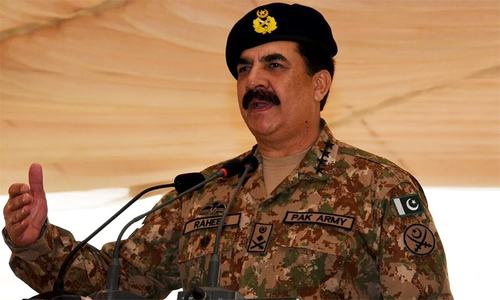Chief of Army Staff General Raheel Sharif said on Tuesday that security and assistance to the civilian government for institution building and development work in remote areas has been his priority during his tenure.
General Raheel Sharif was visiting Quetta, as part of his farewell visits, where he also met troops of Southern Command and the Frontier Corps.
“The people of Balochistan have clearly rejected foreign sponsored terrorists and helped the state in busting their network,” said the army chief while addressing the troops and officers present.
The outgoing army chief also said the tide has turned against terrorists and their sympathisers, and the army will continue working with the federal and provincial governments for greater security and stability.
Paying tributes to the soldiers of Southern Command and the FC, he commended them for the role they played in the construction of more than 1,000 kilometres of China-Pakistan Economic Corridor (CPEC) roads.
Referring to the Gwadar port, General Raheel said, “The Gwadar port and CPEC will usher in a new era of hope and prosperity for the area with dividends reaching the common man”.
On Monday, General Raheel Sharif kicked off his farewell visits nearly a week before he is expected to retire as Chief of Army Staff.
The army chief began his visits at the Lahore Garrison where he addressed and thanked a huge gathering of soldiers of Pakistan Army and Rangers.
Addressing the soldiers, Gen Raheel said accomplishment of peace and stability was "no ordinary task".
General Raheel's legacy
Back in 2013 when Gen Kayani announced that he would not take an extension for a second time, Gen Sharif was not among the favourites in the race for army chief. Even after he beat all the odds to become the chief, his detractors continued to doubt him saying he lacked intelligence and operations background.
But he did not allow those shortcomings to become a handicap and proved everyone wrong.
The high point in his tenure was the start of Operation Zarb-i-Azb in North Waziristan against the Tehreek-i-Taliban Pakistan in June 2014, something from which his predecessor shied away fearing blowback. The operation is now in its last stages. He is also credited for action against militancy in Karachi and partially restoring calm in the city.
Gen Sharif has all along been supportive of the government, except for a statement at the corps commanders’ conference last November when he expressed reservations over civilian administration’s governance. The comment presented the spectacle of a row between the civilian and military leadership. He has, nevertheless, maintained strong influence over the government’s foreign and national security policies.
The general garnered unprecedented popularity among the general public and on social media.
Earlier this year, mysterious banners calling on Gen Sharif to "take over" the government popped up in various cities across the country. Most recently, banners were spotted in Rawalpindi which urged him to contest the general elections in 2018. The army denied having any connection to the banners.
Profile: COAS Gen Raheel Sharif
Born in Quetta on June 16, 1956 to Major and Mrs Muhammad Sharif, Army chief Gen Raheel Sharif grew up steeped in the military tradition.
He attained his formal education at Government College Lahore and later went on to attend the Pakistan Military Academy.
As a young officer, he performed his duties in Gilgit in an infantry brigade and also served as adjutant of Pakistan Military Academy.
Over the years, Sharif climbed up the military ladder mentored by Musharraf who handed him command of the 11th Infantry Division in Lahore.
He was awarded the Hilal-i-Imtiaz, the second highest civilian award and honour that is given to both civilians and military officers of the Pakistan armed forces.
Despite the common surname, Raheel Sharif is not related to Prime Minister Nawaz Sharif, but is known to be close to tribal affairs minister Lieutenant-General Abdul Qadir Baloch, a key confidante of the Sharif family.
The general is married with two sons and a daughter.













































